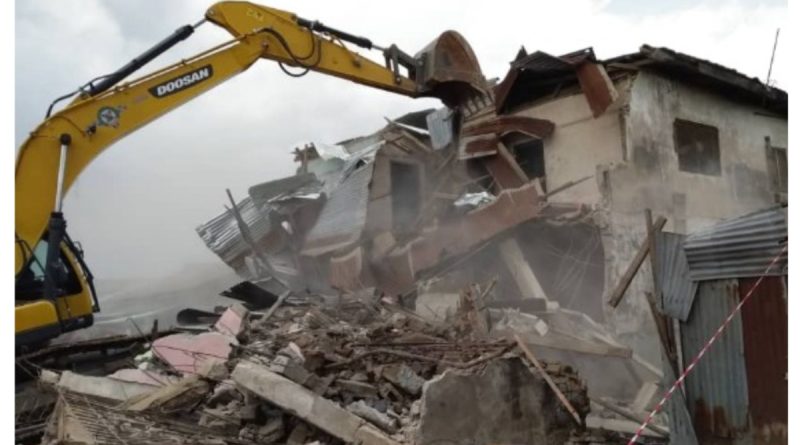Igbo town unions protest systematic Lagos demolitions, seek global intervention
The Association of Igbo Town Unions, ASITU, has strongly condemned what it described as the continued selective destruction of properties by the Lagos State Government, ostensibly targeting the Igbo, even as it vowed to challenge the issue beyond the shores of Nigeria.
The association made its position known during a World Press Conference held in Umuahia, the Abia State capital, titled, “Inhuman and Unending Demolition of Igbo Buildings and Assets in Lagos.”
The National President of the association, Chief Emeka Diwe, who described the demolitions as selectively discriminatory and extra-judicial, noted that the demolitions in Lagos are not just about buildings but an assault on the very principles of nation-building and national cohesion that the founding fathers of Nigeria envisioned.
Chief Diwe added that ASITU is set to seek justice in the International Court of Justice, ICJ, the ECOWAS Court of Justice, the United Nations Human Rights Council, the African Commission on Human and Peoples’ Rights, among other international agencies.
He explained that the decision to seek external help is not due to a lack of confidence in Nigerian institutions, but because the agencies of the Federal Government that ought to have acted against what it regarded as “ethnic cleansing through economic means” failed to respond adequately, instead maintaining a deafening silence.
The association lamented the huge loss of Igbo investments in Lagos, many of which were owned by individuals who did not contravene any procedures.
“Many of the demolished properties had valid approvals issued by the very same Lagos State Government that later destroyed them. Owners who followed due process, who paid their fees, who waited for stamps and signatures, now stand amid ruins, asking one simple question: ‘Why?’” he said.
The National President of ASITU questioned why Igbos, who are catalysts of development across Nigeria, are being targeted for extermination in their own country.
“These are not abandoned structures or overnight shanties. These are life investments: plazas where mothers sell to feed their children, warehouses where young men store goods for their families, shops where dreams of prosperity are nurtured with sweat and prayer,” he lamented.
Chief Diwe noted that, on February 14, 2025, trading plazas belonging to Igbo businessmen at Ebute Ero Market were demolished by agents of the Lagos State Government. Since September 2025, demolitions have intensified at the Trade Fair Complex in Ojo, where countless Igbo traders conduct their daily commerce.
He called on Igbos who are victims of what he described as senseless destruction to approach the Property Right Violation Desk, which ASITU has established to serve as a comprehensive documentation and legal response centre. It will collect and collate verified data on every case of demolition affecting Igbo property owners in Lagos.
He further informed that the association will provide legal representation to affected persons, analyse patterns of enforcement, and mobilise in defence of Igbo property rights, while urging victims not to suffer in silence.
He urged them to create a case “so comprehensive, so well documented, so legally sound that it cannot be dismissed or ignored.”
Diwe said further: “Let no one doubt this. Let no one twist our cries for justice into calls for secession. We have bled for Nigeria. We have built Nigeria. In every corner of this nation, from Sokoto to Calabar, from Maiduguri to Badagry, you will find Igbo men and women who have invested not just their money, but their very lives into the Nigerian dream.
“We are the traders in your markets, the manufacturers in your industrial estates, the teachers in your schools, the doctors in your hospitals, the engineers building your roads and bridges. We are the adhesive that binds this nation together. While others may see Nigeria as a collection of regions, we see it as one country, one economy, one shared destiny.”
He noted that the Igbo consider all parts of Nigeria as one, maintaining that this is why they do not cluster only in Igboland but spread across every state, building, investing, employing, and integrating.
“We marry your daughters and give you many of our sons. We speak your languages and respect your customs. We celebrate Nigeria’s diversity because we live it every single day. No other ethnic group in Nigeria has so thoroughly embraced the idea of a unified Nigerian State through their actions, their investments, and their presence everywhere.
“Yet, we are consistently made to feel unwelcome. We are told we are too ambitious, too industrious, too enterprising. Our success is resented rather than celebrated,” he lamented.
